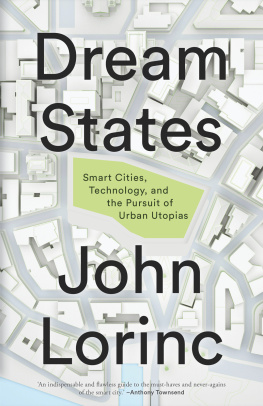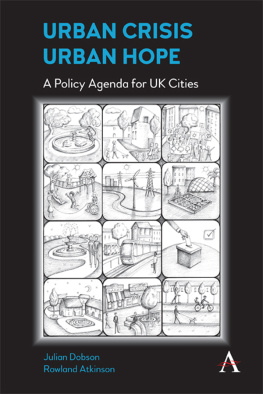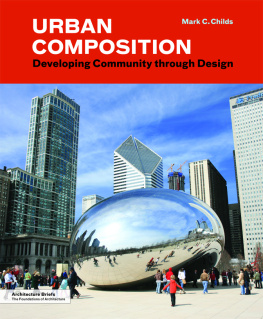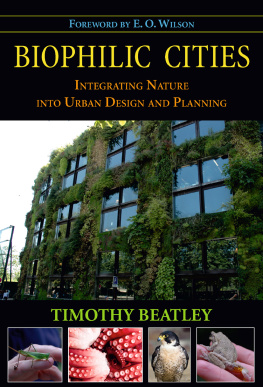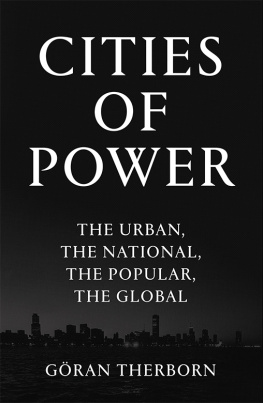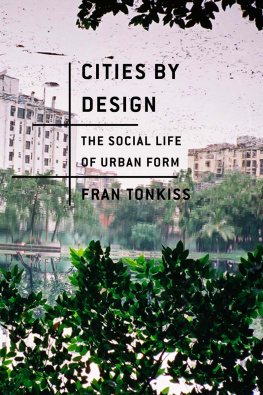Sutherland House
416 Moore Ave., Suite 205
Toronto, ON M4G 109
Copyright 2018 by Joe Berridge
All rights reserved, including the right to reproduce this book or portions thereof in any form whatsoever. For information on rights and permissions or to request a special discount for bulk purchases, please contact Sutherland House at
Sutherland House and logo are registered trademarks of The Sutherland House Inc.
First hardcover edition, May 2019
If you are interested in inviting one of our authors to a live event or media appearance, please contact for more information about our authors and their schedules.
Manufactured in Canada
Cover designed by Shubhani Sarkar
Cover photograph courtesy Shutterstock
Book composed by Karl Hunt
Library and Archives Canada Cataloguing in Publication
Title: Perfect city / by Joe Berridge.
Names: Berridge, Joe, 1946- author.
Description: Includes index.
Identifiers: Canadiana 20190043784 |
ISBN 9781999439514 (hardcover)
Subjects: LCSH: Berridge, Joe, 1946Travel. |
LCSH: City plannersTravel. | LCSH: City planning. |
LCSH: Cities and towns.
Classification: LCC HT166 B47 2019 |
DDC 307.1/216dc23
ISBN 978-1-9994395-1-4
P erfect city? Thats absurd. There is no such thing, any more than there are perfect people. But cities, like people, do have perfect moments. They attain perfection here and there in different ways and it is these moments of perfection we hope to experience when we visit the great cities of the world. It is these moments we strive to create in the building of our own cities. And it is these moments that we have in mind when we search for the perfect place to work and raise a family, the perfect skyscraper or urban beach, the perfect city park or open-air market, the perfect place to sit with a coffee and enjoy the unique life of the city around us.
In recent times, the search for urban perfection has become more complex, more serious. The world is urbanizing at a dizzying rate, the biggest cities fastest of all. They now rival nation states as the places where the social, economic, environmental and political future of the planet will be resolved. The list of issues facing civic leaders is endless. What constitutes the best urban transit system, the best high school? How can we most productively settle new immigrants in the city, or deal most practically with the implications of climate change? What is the best strategy to stimulate urban innovation, to green the city, to bring back broken neighborhoods, to mitigate income inequality, to get people out of their cars, to run a city government that actually gets things done? Figure all this out and you would have the perfect city, but no one municipality is close to delivering it all.
It used to be easier. Much of what we like or admire in the great cities was produced by kings or potentates or all-powerful city bosses: The Prince Regent, Baron Haussmann, Robert Moses, Lee Kuan Yew. In the second half of the last century that top-down vision of urban perfection came to a crashing halt when the writer and activist Jane Jacobs stood in front of bulldozers in New York and brought the expressway construction promoted by her nemesis Robert Moses, the master city builder of mid-century New York, to a standstill. She repeated that same victory just a few years later in Toronto. A new vision of the perfect city was born, one that emphasized bottom-up, community-led, organically driven economic development. Jacobs vision remains to this day the predominant way of thinking about how to make good cities. Yet it too has its shortcomings. Effective, perhaps, at the local level, but it lacks the confidence and competence to tackle the big challenges of the modern megalopolis. There is no organic way to build a massive, integrated, efficient and affordable transportation system, or to plan a new airport, or to develop a new financial district. Suspicion of big ideas about cities, and erosion of the concentration of power necessary to make them happen, has led to lost decades of urban investment in many European and North American cities. All of this leaves us at a critical time in the practice of city building without a single dominant model for undertaking the task. That is not all bad. Rather, we are seeing fresh energy and experimentation in cities around the world, and an unprecedented global exchange of ideas, strategies and projects. The perfect city is being born the world over. It is this fascinating urban ferment and the resultant, exhilarating new searches for urban perfection that inspired this book.
* * *
Any conversation about perfectibility needs to begin with an understanding of the essential nature of the entity under considerationthe city. I work in and on cities all over the world and stand in awe of their vast complexity, their remarkable differences and yet their intriguing similarities. As a city planner, I think of myself as a kind of urban mechanic. Each city is a machine I am trying to fix, and each needs to be approached with a measure of humility because each has a life of its own. While cities are first of all machines, physical objects, they share a metabolism with their human inhabitants and the natural world. They are machines driven by the dynamics of history, geography, technology, environmental change and the global economy. Like every other living thing, they have patterns of growth and decline, regeneration and death, partly subject to human tinkering but in an equally important sense almost independent of our interventions, with dynamics all their own. Often times, modern cities seem almost to be making themselves, with those in charge, the perfection seekers, struggling for a mere semblance of control over what is happening. They cannot be planned so much as they can be nudged, patched, or pushed, especially today as the ever-accelerating pace of urban change shifts into overdrive. An urban mechanic can only be effective by acknowledging the power of these forces. You cannot confront them; you have to work with them as best you can.
Like any other machine, a great city is purpose built. The first task of the urban machine is to create and distribute wealth. It is on the economic prosperity of a city that all its other attributes depend. Living in Toronto, one of the most economically successful cities in the modern world, it is easy to forget how fundamental the creation of wealth is to the metropolis, along with the key processes of distributing that wealth through new jobs, investment in transit and service infrastructure, and the provision of community benefits like parks, schools and libraries. Wealth engenders a sense of hope and possibility in people. For the increasingly immigrant city, as most global metropolises now are, the prospect of a good job is the key bargain between the city and its new citizen. Without that, nothing but trouble lies ahead. A citys ability to generate wealth improves and declines partly in response to wider economic forces but also due to the quality of its management. Perfect City will take you to cities that have struggled, and are still struggling, with their ability to create new wealth for their residents. It will share those cities strategies for urban prosperity and their perplexity with that particular quandary of the modern urban economy, its tendency, the more economically successful it becomes, to exacerbate a greater divide between rich and poor.



